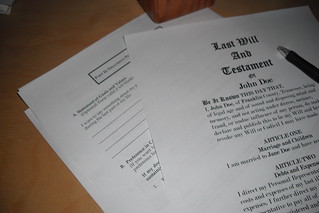Changing will provisions at the end can be problematic
John Grisham’s latest bestselling novel revolves around a wealthy man crafting a handwritten will that completely cuts out his family and leaves the fortune to his housekeeper.

The reason the man did this just prior to taking his own life, other than that his two adult children are fairly odious people, is the crux of “Sycamore Row,” but the novel also points to some pertinent legal issues relating to last-minute decisions regarding estates.
While an individual may have valid reasons for revoking an existing will as death appears to be imminent, such decisions must be handled carefully to avoid potentially significant problems.
“When death grows near, the issue of a legacy can come into much sharper focus,” Arden Dole wrote in a recent Wall Street Journal article. “People with money and property sometimes choose that moment to change their wills or estate plans. Done right, deathbed revisions may save their families income and estate taxes and prevent misunderstandings and administrative hassles.
“If not handled carefully, though, it can leave a will open to legal challenges that can drag on for many years, particularly if the late changes are sweeping or appear out of character.”
Ideally, an estate plan is considered carefully when it’s created and is regularly reviewed, so it won’t need major deathbed changes.
Financial advisers are often asked to tweak elements when a client nears death, even though the best estate plan is one that’s been carefully considered and subjected to frequent reviews, according to Dale.
“Sometimes, clients can’t come to a decision until faced with their own mortality,” Atlanta-based adviser Scott Beaudin was quoted as saying. “But based on that poignant moment in time, it’s possible to do things that optimize your planning.”
“When the prospect of death becomes real, it also may change a person’s views on how, and how much, to give to various individuals, or to charity,” the story stated.
However, if a member of the dying person’s family becomes involved in making late changes, it is critical that they have a power of attorney or similar document, to ward off legal challenges.
“Normally, it’s the relative of a client who calls and says, ‘My father just had a stroke, can you help me?’ ” Barry Kaplan, a wealth manager at Atlanta-based Cambridge Wealth Counsel, told the WSJ.
“Issues like taxes and the cost basis of an investment are complicated enough in normal times, and many people don’t think about them when dealing with a death in the family,” Dale wrote. “Still, last-minute changes require special caution.
“To avoid a challenge to such changes, a medical or mental competency examination can prove invaluable, notes Michael Puzo, a partner in the Boston office of law firm Hemenway and Barnes LLP. Still, he cautions against too many substantive changes at the eleventh hour.”
“Typically, it’s a bad time to change a will,” Puzo stated.
